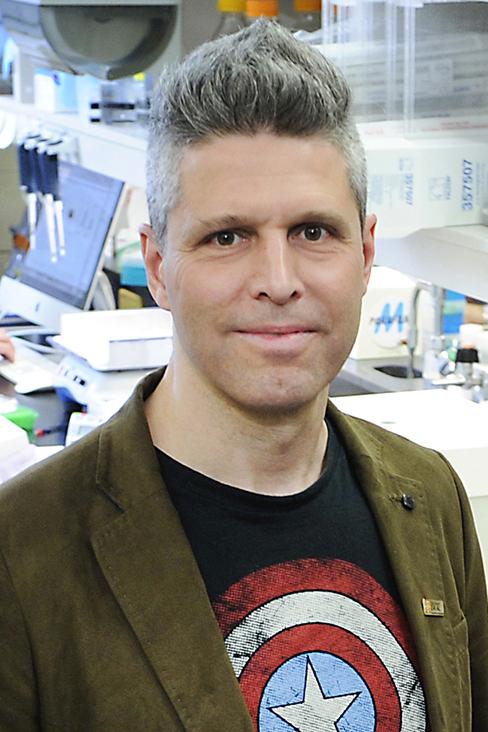Dr. Luc Vallières
Full Professor, Molecular Medicine

Dr. Luc Vallières is Full Professor in the Department of Molecular Medicine at Laval University (Quebec City). In 2002, after a postdoctoral training at The Salk Institute (California), he established his laboratory, specialized in neuroimmunology, at the Laval University Hospital Research Center. He studies two different neurological diseases: multiple sclerosis and brain cancer. His research program aims to better understand the biology of immune cells in these conditions in the hope of finding a way to neutralize or stimulate them for therapeutic purposes. He is especially interested in a population of myeloid cells that constantly patrols the brain vasculature and that was discovered in his laboratory (Journal of Neuroscience 2008, 28: 10187-10199). His research is mainly funded by the Multiple Sclerosis Society of Canada, the Canadian Institutes of Health Research (CIHR), and the Natural Sciences and Engineering Research Council of Canada. He was supported by national career awards from the CIHR and “Fond de la Recherche en Santé du Québec”. He is now a member of the editorial board of Mediators of Inflammation and teaches the course Principle of Neuroimmunology at Laval University.
Learn more about Dr. Vallières
How did you become interested in MS research? What inspires you to continue advancing research in this field?
I became interested in MS research because of the MSSC, which gave me a wonderful opportunity in 2004 by providing me with one of my first grants as a new investigator. What inspires me to continue is the quest for knowledge and the hope of improving the quality of life of people with demyelinating autoimmune diseases.
What do you enjoy most about doing research and what are some of the challenges you face?
I enjoy making discoveries on immune processes and sharing my knowledge with students and colleagues. The biggest challenge is to find more financial support that would allow us to be more productive and original in our research.
Describe the importance and level of collaboration in your research?
Collaborations are essential in our research program, e.g. to obtain genetically-modified mice, human biopsies, scientific advices and services. This is reflected in our publications, on which many international and national collaborators are included as authors.
How important is the support from the MS Society in enabling you to conduct research?
Totally essential! I have been supported by the MSSC since 2004. My research program on MS is now only supported by the MSSC. The MSSC is also essential for networking.
If you could ask one question to a person living with MS that would help you design your study, what would it be?
What topic would you work on if you were a researcher in the field of MS?
Dr. Vallières’s MS Society supported project: